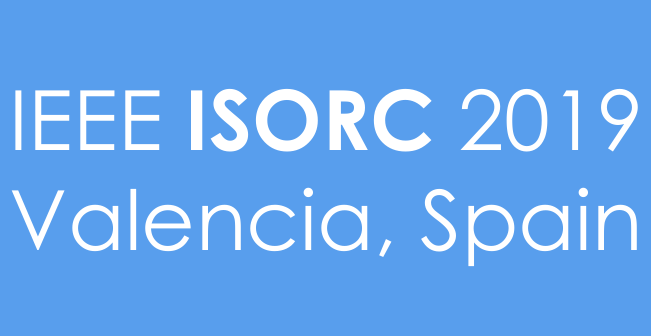CALL FOR PAPERS
ISORC has become established as the leading event devoted to state-of-the-art research in the field of object/component/service-oriented real-time distributed computing (ORC) technology. In addition to the main conference, for the first time, ISORC 2019 will organize a special session dedicated to posters and demos, where the objective is to allow participants to show prototypes, tools, simulators and systems, which demonstrate the applicability of real-time computing to different applications. Accepted papers from ISORC 2019 will be invited for submission to a Special Issue of Journal of Systems Architecture.
Main theme and topics
We solicit high-quality papers pertaining to all aspects of ORC technology and especially those that are
well aligned with the 2019 theme. Authors are encouraged to consider submissions with a practical orientation
and validation related to Case Studies & Applications in this area.
The specific ORC focus areas include, but are not limited to:
- Programming and system engineering: real-time programming challenges, ORC paradigms, object/component models, languages, synchronous languages.
- Embedded distribution middleware, model maintenance, system of systems, time-predictable systems and hardware.
- Distributed computing and communication infrastructures: real-time communication, networked platforms, protocols, Internet QoS, peer-to-peer computing, sensor networks, VANETS and V2V and V2I communication, trusted and dependable systems.
- Algorithms for Real Time Analytics: clustering and classification approaches, stream processing algorithms, real time decision tree generation and update, real time machine learning, statistical approaches. Approaches related to stream correlation and sampling.
- System software: real-time kernels and OS, middleware support for ORC, QoS management, extensibility, synchronization, resource allocation, scheduling, fault tolerance, security.
- Real-time algorithms and infrastructure support for decentralized architectures including distributed ledgers with a focus on scalability and resilience.
- Applications: Medical devices, intelligent transportation systems, Industrial automation systems and Industry 4.0, Internet of Things and Smart Grids, Embedded systems (automotive, avionics, consumer electronics, building systems, sensors, etc), multimedia processing, RT Web-based applications.
- System evaluation: performance analysis, monitoring & timing, dependability, end-to- end QoS, overhead, fault detection and recovery time.
- Cyber-physical and cyber-social systems (e.g. social media analytics).
- Time-sensitive social dispersed computing.
Guidelines for Manuscripts
IEEE ISORC 2019 invites papers in three categories. Submission guidelines for each category of paper are as follows:
- Regular Research Papers: Papers should describe original work and be maximum 8 pages in length using the IEEE paper format (link to templates). A maximum of two extra pages may be purchased.
- Industrial Papers and Practitioner Reports: Papers describing experiences of using ORC technology in application or tool development projects, are an integral part of the technical program of ISORC. A majority of these papers are expected to be shorter and less formal than research papers. They should clearly identify and discuss in detail the issues that represent notable industrial advances. Reports with project metrics supporting their claims are particularly sought, as well as those that show both benefits and drawbacks of the approaches used in the given project.
- Short Papers: Short research papers, 4 pages using the IEEE format, on real-time analytics are also invited, and should contain enough information for the program committee to understand the scope of the project and evaluate the novelty of the problem or approach.
Papers are to be submitted through the Easychair system.
Acceptance Criteria
According to program committee guidelines, papers presenting practical techniques, ideas, or evaluations will be favored. Papers reporting experimentation results and industrial experiences are particularly welcome. Originality will not be interpreted too narrowly. Papers that are based on severely unrealistic assumptions will not be accepted however mathematically or logically sophisticated the discussion may be.
Publication information
All accepted submissions will appear in the proceedings published by IEEE.
Each accepted paper shall be accompanied by at least one non-student registration.
Please contact either
Aniruddha Gokhale,
Weichen Liu, or
Mathias Pacher if you have questions regarding the paper submissions.













